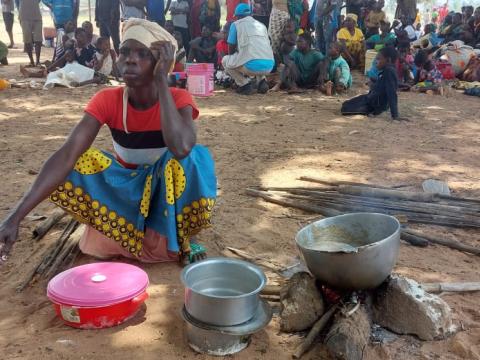Mozambique: Thousands flee violence as dire Humanitarian Crisis Unfolds

A rapidly escalating humanitarian crisis is unfolding in Nampula Province, where violence reportedly perpetrated by Non-State Armed Groups in the districts of Memba and Erati has forced thousands of families to flee their homes in desperation.
Provincial authorities confirmed four fatalities, 101 houses burned down, and an unverified number of people kidnapped, according to the country’s daily paper, Noticias reported.
According to a mission report by the provincial humanitarian cluster, more than 4,600 families, representing an estimated 23,000 people, have sought refuge in the Post Administrative area of Alua-Sede, in Eráti District, where a multisectoral assessment is currently underway. As insecurity persists, these figures are expected to rise daily, highlighting the urgent need for coordinated humanitarian assistance and protection for affected communities.
Families fleeing terrifying night-time incursions, during which homes were deliberately burned, have described painful journeys of up to five days from their communities to displacement sites, where they arrived with nothing but the clothes on their backs.
“I arrived yesterday at 4 p.m. with my family from the community of Namajua. Our homes were burned down, I lost everything, and I left with nothing but the clothes I am wearing,” says Dos Santos.
The cluster’s findings paint a deeply concerning picture of conditions in the displacement sites. These sites are dangerously overcrowded. Families sleep in the open, often under trees, due to a critical lack of shelter, with only 53 tents available across all locations. Humanitarian supplies are severely overstretched: food assistance currently reaches barely 200 families, and the shortage of essential non-food items, such as bedding and cooking utensils, is acute.
The complete absence of basic water and sanitation infrastructure in several sites is creating a breeding ground for disease. Overcrowding has already triggered a sharp rise in cases of scabies, coughs, and diarrhoea among children, underscoring the minimal health service capacity despite the presence of a mobile health brigade.
Protection risks are escalating rapidly. The lack of safe spaces, privacy, and gender-segregated latrines places women and girls at extreme risk of Gender-Based Violence. Children, whose education has been violently interrupted, face constant threats of exploitation and recruitment, while unaccompanied children and those with disabilities struggle to access help.
This profound crisis reflects the seemingly continued spread of the Cabo Delgado conflict. World Vision, as part of the multisectoral rapid assessment team, is urgently calling for expanded, coordinated life-saving assistance, including emergency food and shelter, psychosocial support, safe spaces for children, and dignified sanitation solutions, to uphold the dignity and wellbeing of thousands of Mozambican families.
By António Massipa in Nampula